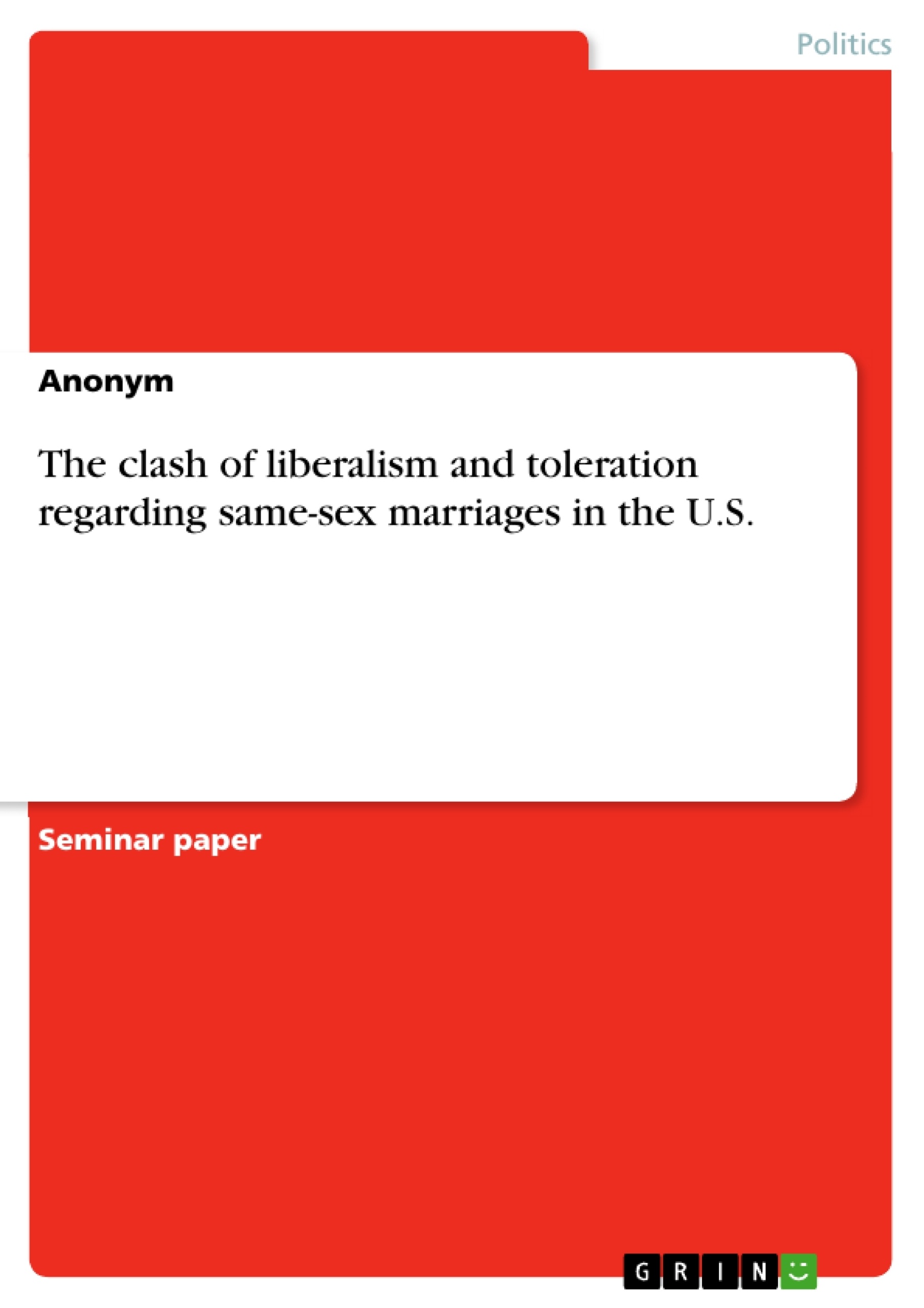Excerpt
Table of Contents
Abstract
Introduction
Toleration
Liberalism
Toleration, Liberalism and Religion
Religion – reason for clash between liberalism and toleration?
Conclusion
Abstract
Although there are marriage-like unions for same-sex couples in the U.S., the traditional institution of marriage is still only reserved for the conventional heterosexual couple. As a modern liberal country the U.S. would be expected to be tolerant on this issue, giving this subcultural group the freedom to marry. Some reasons why this is not the case can be found in the United States` strong ties to religion. This paper outlines the influence of religion on the interplay of liberalism and toleration in the case of same-sex marriages in the U.S.
The clash of liberalism and toleration regarding same-sex marriages in the U.S.
Introduction
The issue of same-sex marriages is a very complex and controversial one. In the U.S. it was first addressed in 1993 in Hawaii when the state’s Supreme Court ruled that denying the benefits of marriage to same-sex couples constituted gender discrimination. Panicked by these developments, the US Congress enacted in 1996 the Defense of Marriage Act, which defines marriage as the “legal union between one man and one woman”. The Defense of Marriage Act overrules decisions made by individual states concerning questions about the eligibility of marriage. Hence, marriage of same-sex partners even if recognized by an individual state is not considered marriage at the federal level. Moreover, no state is forced to recognize a marriage of same-sex couples granted by another state. Despite these developments, Hawaii created the most comprehensive domestic partnership legislation of any of the states. Many other states followed Hawaii and enacted certain partnership laws or even civil unions, as for example Massachusetts. (Culhane, 1999)
However, a civil union or partnership is not the same as a civil marriage. The benefits of civil unions and partnerships give same-sex couples only a small part of the benefits that married opposite-sex couples get. Same-sex couples in the U.S. are denied more than 1000 federal protections and rights. These federal and state rights range from the ability to file joint tax returns to the responsibility of making decisions on a partner’s behalf in medical emergencies. (National Organization for Women, 2004 & Culhane, 1999)
In a liberal country, with the central values of autonomy and toleration at its core, why is it that two people of the same sex are not allowed to be legally joined in the same institution as couples of the opposite sex are? Hence, this paper will firstly define what toleration actually means, what role religion plays in the interplay between liberalism and toleration, and if toleration is only possible when state and religion are two separate institutions which do not influence each other. Discussing such issues will hopefully be helpful in answering the research question: why do liberalism and its central value toleration seem to conflict in the case of the U.S. government’s attitude towards same-sex marriage?
Toleration
It is vital for this discussion to first define what the term toleration means. Is it enough in order to tolerate homosexuals by just leaving them alone? Is this even possible to do while not approving of their conduct or lifestyle? Michael Walzer had a very broad conception of toleration thinking that “all social arrangements through which we incorporate difference, coexist with it, allow it a share of social space” are toleration. (as cited in Ten, 1999, p. 1) His conception includes a variety of attitudes or state of minds. To these attitudes, belong the acceptance of difference for the sake of peace, indifference to differences, recognition that others have rights, openness, curiosity, respect and even the enthusiastic endorsement of differences. Successful toleration by the state does not mean that it depends on one particular form of toleration. Some states prefer some forms over others. With these very diverse forms of toleration, Walzer gives a very broad definition of toleration. Although he admits that the enthusiastic endorsement of differences cannot be really called toleration, he nevertheless includes it in his conception. (Walzer, 1997)
John Locke and John Stuart Mill, on the other hand, agreed that toleration involves some negative attitude toward what is tolerated. However, this negative attitude is combined with the behavior of not interfering in any coercive way. (Ten, 1999) This would mean that toleration of homosexuals requires a negative attitude towards them while at the same time it requires non-interfering behavior. But what about the moral thinking that same-sex marriage is wrong?
Michael Sandel agrees that liberal toleration is “non-judgmental” but at the same time he argues against this view. One cannot completely ignore his own moral standards. Sandel thinks that moral views play a role and should not always be given up in favor of a better social cooperation or autonomy of the people in question. (Ten, 1999) The problem lies exactly here. Is it not impossible to accept the lifestyle of homosexuals while completely disagreeing with it?
Bernard Williams (1996) holds the view that toleration is an almost impossible virtue. The tension lies between one’s own commitment and the acceptance of the commitments of others. Accepting a different view while holding one’s own view is like tolerating the intolerable. This is very hard to do. Therefore, Williams explains that the practice or attitude of toleration must not always be based on the personal virtue of toleration. He distinguishes between toleration as a virtue (which is almost impossible to achieve) and toleration in practice. Toleration in practice can have many forms. It can involve being skeptical about one’s own view (skepticism), not caring about the other view (indifference), believing a bit of truth to be in every view (broad church view) or accepting the other view because it is the best for both parties involved (Hobbesian equilibrium).
[...]
- Quote paper
- Anonymous, 2005, The clash of liberalism and toleration regarding same-sex marriages in the U.S., Munich, GRIN Verlag, https://www.grin.com/document/55668
Publish now - it's free






















Comments